Periperi | |
|---|---|
| Country | |
| Region | Northeast |
| State | Bahia |
| Time zone | UTC-3 |
Periperi is a subdistrict north of Salvador, in the Brazilian State of Bahia.
Periperi | |
|---|---|
| Country | |
| Region | Northeast |
| State | Bahia |
| Time zone | UTC-3 |
Periperi is a subdistrict north of Salvador, in the Brazilian State of Bahia.
For some, Periperi is viewed as the cultural core of the many suburbs surrounding Salvador. [1] It has one of the largest venues in the Salvador area, the Sport Club of Periperi. On Sundays, locals enjoy pagodes (samba dances), serestas (seniors' balls), informal drumming sessions on the beach, and the Black Bahia funk dance. The Black Bahia dance started in the early 1980s and, from 1981 to 1996, was held every Sunday except during Carnival. In comparison to pagode or samba dancers, Black Bahia dancers have positive reputations. Whereas samba enthusiasts often become violent and uncivil, Black Bahia dancers are courteous and polite. [1]
The dichotomy between these two groups exemplifies the many characteristics of Bahia. Within the various subcultures in PeriPeri, popular music styles, clothing styles and dance styles differ drastically. The youth in the area can choose which type of lifestyle fits them. Cultural diffusion within the region has allowed the music styles to converge, change and diverge. [2] Periperi's location in relation to Salvador allows people who live outside of the city center to participate in an urban-like social environment.
Estudio Periferia is located in Periperi, and is the only recording studio available to bands who are not in the charts. [1] Periperi is also the home of the bloco afro group Ara Ketu (people of Ketu), [3] which originated there in 1980. [4] The Afro Blocos feature a wide array of instruments, and samba-reggae rhythms. They are generally socially active groups, and give back to the local community. Many are exclusively black, but Ara Ketu claims to be the first group to have opened itself to people of all classes, ethnicities and religions. [3]
It is important to many bloco afro groups to distinguish themselves from the Afro-Bahian culture, and thereby avoid the Bahian mass media. Some groups, such as the group Ile Aiye, do this through cultural inspiration from the U.S. black music scene. Ile Aiye incorporates manipulated and reinterepeted sound recordings from black U.S. artists. Additionally, their fashion style is heavily influenced by black U.S. artists. Other blocos afro, such as Olodum, express themselves with more traditional music that focuses on their African heritage. Generally, young Brazilian funk enthusiasts prefer the former groups and their associations with blackness and modernity. [1] [5] These groups make Periperi very central to the Brazilian funk scene.
Samba, also known as samba urbano carioca or simply samba carioca is a Brazilian music genre that originated in the Afro-Brazilians communities of Rio de Janeiro in the early 20th century. Having its roots in the cultural expression of West Africa and in Brazilian folk traditions, especially those linked to the primitive rural samba of the colonial and imperial periods, is considered one of the most important cultural phenomena in Brazil and one of the country symbols Present in the Portuguese language at least since the 19th century, the word “samba” was originally used to designate a “popular dance”. Over time, its meaning has been extended to a “batuque-like circle dance”, a dance style and also to a “music genre”. This process of establishing itself as a musical genre began in the 1910s and it had its inaugural landmark in the song “Pelo Telefone”, launched in 1917. Despite being identified by its creators, the public and the Brazilian music industry as “samba”, this pioneering style was much more connected from the rhythmic and instrumental point of view to maxixe than to samba itself.
The music of Brazil encompasses various regional musical styles influenced by African, European and Amerindian forms. Brazilian music developed some unique and original styles such as forró, repente, coco de roda, axé, sertanejo, samba, bossa nova, MPB, música nativista, pagode, tropicália, choro, maracatu, embolada, frevo, brega, modinha and Brazilian versions of foreign musical styles, such as rock, soul, hip-hop, disco music, country music, ambient, industrial and psychedelic music, rap, classical music, fado, and gospel.

Bahia is one of the 26 states of Brazil and is in the northeastern part of the country on the Atlantic coast. It is the 4th-largest Brazilian state by population and the 5th-largest by area. Bahia's capital is the city of Salvador, located on a spit of land separating the Bay of All Saints from the Atlantic. Once a monarchial stronghold dominated by agricultural, slaving, and ranching interests, Bahia is now a local manufacturing center whose last four elections have been dominated by the Workers' Party. The state is home to 7% of the Brazilian population and produces 4.2% of the country's GDP..

Samba is a lively dance of Afro-Brazilian origin in 2/4(2 by 4) time danced to samba music whose origins include the Maxixe.

Candomblé Ketu is the largest and most influential branch (nation) of Candomblé, a religion practiced in Brazil, Argentina, and Uruguay. The word Candomblé means “ritual dancing or gather in honor of gods” and Ketu is the name of the Ketu region of Benin. Its liturgical language, known as Iorubá or Nagô, is a dialect of Yoruba. Candomblé Ketu developed in the early 19th century and gained great importance to Brazilian heritage in the 20th century.

The Sisterhood of Our Lady of the Good Death is a small but renowned Afro-Catholic religious group in the state of Bahia, Brazil.
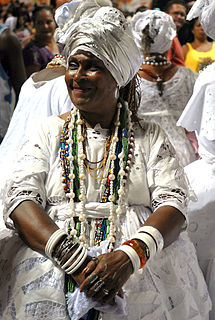
Axé is a popular music genre originated in Salvador, Bahia, Brazil in the 1980s, fusing different Afro-Caribbean genres, such as marcha, reggae, and calypso. It also includes influences of Brazilian music such as frevo, forró and carixada. The word Axé comes from the Yoruba term àṣẹ, meaning “soul, light, spirit or good vibrations”. Axé is also present in the Candomblé religion, as “the imagined spiritual power and energy bestowed upon practitioners by the pantheon of orixás”.
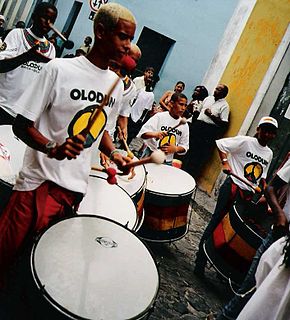
Olodum is a bloco-afro from Salvador's carnival, in Bahia, Brazil. It was founded by the percussionist Neguinho do Samba.

The Carnival of Brazil is an annual Brazilian festival held between the Friday afternoon before Ash Wednesday at noon, which marks the beginning of Lent, the forty-day period before Easter. During Lent, Roman Catholics and some other Christians traditionally abstained from the consumption of meat and poultry, hence the term "carnival", from carnelevare, "to remove meat."

Dorival Caymmi was a Brazilian singer, songwriter, actor, and painter active for more than 70 years beginning in 1933. He contributed to the birth of Brazil's bossa nova movement, and several of his samba pieces, such as "Samba da Minha Terra", "Doralice" and "Saudade da Bahia", have become staples of música popular brasileira. Equally notable are his ballads celebrating the fishermen and women of Bahia, including "Promessa de Pescador", "O Que É Que a Baiana Tem?", and "Milagre". Caymmi composed about 100 songs in his lifetime, and many of his works are now considered to be Brazilian classics. Both Brazilian and non-Brazilian musicians have covered his songs.
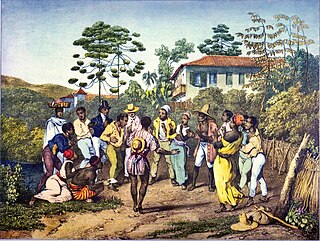
Batucada is a substyle of samba and refers to an African-influenced Brazilian percussive style, usually performed by an ensemble, known as a bateria. Batucada is characterized by its repetitive style and fast pace.
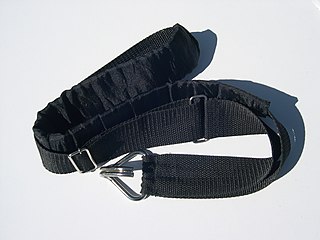
A repinique is a two-headed Brazilian drum used in samba baterias. It is used in the Rio de Janeiro and São Paulo Carnival baterias and in the baterias of Bahia, where it is known as repique. It is equivalent to the tom-tom in the non-Brazilian drum kit or to the tenor drum in marching bands. It is tuned very high to produce a tone that cuts through the sound of the rest of the bateria and it is a lead and solo instrument.

Olga de Alaketu or Mother Olga was a prominent Candomblé high priestess, who was influential in promoting Candomblé and distancing it from Catholicism.

Frevo is a dance and musical style originating from Recife, Pernambuco, Brazil, traditionally associated with Brazilian Carnival. The word frevo is said to come from frever, a variant of the Portuguese word ferver. It is said that the sound of the frevo will make listeners and dancers feel as if they are boiling on the ground. The word frevo is used for both the frevo music and the frevo dance.

Bahian Carnival is the annual carnival festival celebrated in the Brazilian state of Bahia, mainly in its capital, Salvador. The event lasts officially for six full days: it starts on a Thursday, then follows the usual five days of carnival. The term may also be used to comprise related events that happen immediately before or after the carnival in Bahia. Therefore, extending the duration for up to twelve days.
Samba-reggae is a music genre from Bahia, Brazil. Samba reggae, as its name suggests, was originally derived as a blend of Brazilian samba with Jamaican reggae as typified by Bob Marley.

Ilê Aiyê is a carnival block from Salvador, Bahia, Brazil. It is located in the Curuzu/Liberdade neighborhood, the largest afro-descendent population area of Salvador. The name stems from the Yoruba language: ilê - home; aiyê - life; which can be interpreted as 'eternal heaven'. It was founded in 1974 by Antônio Carlos “Vovô” and Apolônio de Jesus, making it the oldest Afro-Brazilian block.
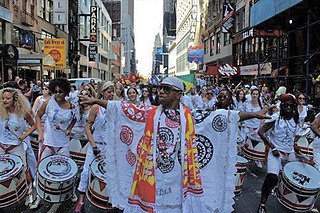
Batalá is an international samba reggae music project. The name Batalá is a combination of the phrase "bate lá" meaning "hit there" in Portuguese and Obatalá (Oxalá), the Candomblé deity who is the father of the Orixas and of all humanity.

Samba on Your Feet is a documentary film by Eduardo Montes-Bradley also known as Samba! reflections of Africa in Brazilian culture. The film goes behind the scenes of samba and Carnival to reveal the cultural and racial clash that gave birth to a new tradition in Rio de Janeiro.
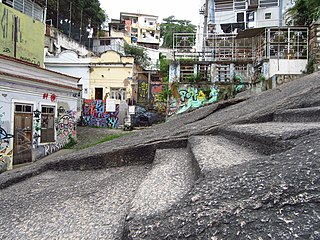
Pedra do Sal is a historic and religious site in Rio de Janeiro, in the neighborhood of Saúde. The site was originally a quilombo village. An association group still lives there, formally known as the Community Descendents of the Quilombos of Pedra do Sal. The site was recognised in 1984 by INEPAC, the Institute for State Cultural Heritage.